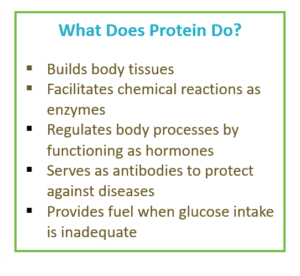
Can Protein Improve Immunity?
Does an apple a day keep the doctor away? It might not be that simple, but many of us are looking for foods that can make us healthier and boost immunity.
Balance is key, according to Sheena Gregg, registered dietitian and assistant director of the Department of Health Promotion and Wellness at the University of Alabama.
“In addition to helping our body fight disease, consuming a balanced diet helps our energy levels, improves our mental health and aids in our body’s overall growth,” she said. “It can also play a role in weight management.”
Protein is Essential
 Protein is particularly important. While it’s often thought of as something to eat when it comes to losing weight or reaching fitness goals, protein plays a versatile role in our bodies and is an essential component to our diet, she said.
Protein is particularly important. While it’s often thought of as something to eat when it comes to losing weight or reaching fitness goals, protein plays a versatile role in our bodies and is an essential component to our diet, she said.
“When translated from its Greek origin, protein means ‘of prime importance.’ Whenever the body is growing, repairing or replacing tissue, proteins are involved,” said Gregg.
Both animal and plant-based protein sources are important, as they provide needed amino acids, as well as an additional package of vitamins and minerals specific to the various food groups. “Having both animal and plant proteins as part of a balanced diet minimizes the risk of overall nutrition deficiencies,” she said.
Protein plays several roles in our body such as serving as a building block to our body tissues, facilitating chemical reactions as enzymes, regulating body processes by functioning as hormones, serving as antibodies to protect the body against diseases, providing fuel when our glucose intake is inadequate, as well as many other functions.
Animal vs. Plant
 “Animal protein is often considered a better source of protein compared to plant-based proteins due to the amino acid content,” said Gregg. “Animal protein is frequently referred to as a ‘high quality protein’ or ‘complete protein’ as it provides all nine of the essential amino acids that are needed by the human body through diet.”
“Animal protein is often considered a better source of protein compared to plant-based proteins due to the amino acid content,” said Gregg. “Animal protein is frequently referred to as a ‘high quality protein’ or ‘complete protein’ as it provides all nine of the essential amino acids that are needed by the human body through diet.”
In addition, animal proteins also have a higher level of bioavailability compared to plant-based proteins, meaning that they are more easily digested, absorbed, and utilized by the body compared to their plant-based counterparts, she said.
Most plant-based proteins are “incomplete proteins” as they are missing one or more essential amino acids and cannot exclusively support protein synthesis. They must be eaten in combination with other foods to be complete. An exception to this is soybeans. Soybeans are a “complete” protein, providing all nine essential amino acids.
“There are several micronutrients of concern for those who omit animal proteins from their diet due to these nutrients either being found exclusively in animal products or are not as easily absorbed in plant-based sources. These nutrients include but are not limited to Vitamin B12, Vitamin D, zinc, and iron,” said Gregg.
In fact, it would take approximately nine cups of chopped kale to equal the same amount of protein in three ounces of lean ground beef.
In addition to being high quality protein sources for the body, there are other benefits to including animal protein.
“As a common protein source in grocery stores, consumers often find animal proteins to be frequently on sale and a cost-effective component to meals. Additionally, items such as hard-boiled eggs can be a convenient grab and go option that is a nutrient dense choice for the consumer,” said Gregg.
Research also suggests that consumption of animal proteins can lead to better satiety levels compared to plant- based proteins, thus playing an important role in weight management.
Soy Stands Out
There is one plant protein that stands out.
Though most all plant-based proteins are incomplete, soy protein is an exception as it contains all nine of the essential amino acids needed by the body.
“For those following a vegetarian or vegan diet, soy protein can be a convenient way to get adequate protein in the diet and is often utilized in the food industry for meat-alternative vegetarian products such as burger patties, vegan sausage patties, soy crumbles and vegan protein powders,” said Gregg.
While vegan diets have increased in popularity over the last decade, Gregg said incorporating protein from a variety of sources, plant and animal, can aid in optimal health.
“Both quality plant sources and lean animal protein like meat, fish, and poultry can provide a rounded nutritional profile to help aid the body in many ways,” she said.
Protein plays an important role in keeping bodies healthy. Incorporating protein from both plant and animal sources provides the most balanced diet.


























